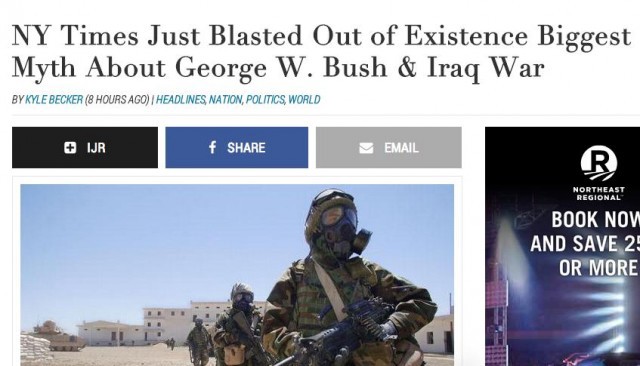Rewriting History in Real Time: A Social Media Guide

In the process of trying to figure out when your cousin’s birthday is, or looking at photos of your old partners’ weddings, or deciding whether or not to attend your 10/20/30/40-year reunion, there’s a reasonable chance you will come across some variation of this headline on Facebook. Beneath it will be comments from friends and family and strangers, in which the dinner table arguments of a decade ago are relitigated. The details, which were foggy in the first place, are now foggier. Someone will probably bring up beheading immediately.
The source for this post — which comes from a profoundly cynical, and popular, news project called the Independent Journal Review, which treats news stories like ideological choose-you-own-adventure books — is “The Secret Casualties of Iraq’s Abandoned Chemical Weapons,” a blockbuster report by C. J. Chivers. It will not come up, because it has been buried behind at least one layer of translation — from boring, caveated “writing” into pitched and colloquial social patois (but still with a VERY CREDIBLE font). Its new headline, or headlines, are not about the story so much as they are about their prospective sharers, and so those are the terms in which it will be discussed. The new versions of the story say, “I was right” or, at least, “you were wrong.” The structure within which they appear is such that engaging with the post — sharing, disagreeing, Liking — is much easier than investigating is provenance, even if it’s just three clicks away.
The Times story contains many “shareable” parts but its core is brutally unsharable: Behind every revelation is a complicating and depressing explanation.
For example:
In all, American troops secretly reported finding roughly 5,000 chemical warheads, shells or aviation bombs, according to interviews with dozens of participants, Iraqi and American officials, and heavily redacted intelligence documents obtained under the Freedom of Information Act.
But:
during the long occupation, American troops began encountering old chemical munitions in hidden caches and roadside bombs. Typically 155-millimeter artillery shells or 122-millimeter rockets, they were remnants of an arms program Iraq had rushed into production in the 1980s during the Iran-Iraq war.
All had been manufactured before 1991, participants said. Filthy, rusty or corroded, a large fraction of them could not be readily identified as chemical weapons at all. Some were empty, though many of them still contained potent mustard agent or residual sarin.
And:
The United States government says the abandoned weapons no longer pose a threat.
But:
[N]early a decade of wartime experience showed that old Iraqi chemical munitions often remained dangerous when repurposed for local attacks in makeshift bombs, as insurgents did starting by 2004.
Double but:
Others pointed to another embarrassment. In five of six incidents in which troops were wounded by chemical agents, the munitions appeared to have been designed in the United States, manufactured in Europe and filled in chemical agent production lines built in Iraq by Western companies.
When you encounter this story, it is likely that it will be in the context of someone you know suggesting that President Bush and his supporters are owed some sort of apology; that for all that smoke in the early 2000s, there was actually fire. By now the memory of what those years were actually like has been completely suppressed:
Saddam Hussein’s armoury of chemical weapons is on standby for use within 45 minutes, Tony Blair’s dossier revealed today.
The Iraqi leader has 20 missiles which could reach British military bases in Cyprus, as well as Israel and Nato members Greece and Turkey.
He has also been seeking to buy uranium from Africa for use in nuclear weapons. Those are the key charges in a 14-point “dossier of death” finally published by the Government today.
In an introduction, Mr Blair says that the evidence leaves Britain and the international community no choice but to act.
At its core, this is a story about a decades-long failed project in American foreign policy and its human cost. It’s depressing — it’s something that no healthy person could feel good about, even if it somehow proves them right. Luckily, some of the loudest voices on the internet — new de facto gatekeepers, even more agile and unaccountable than the television and radio hosts that came before them, with audiences who know what they want to hear — have a solution to this problem. And they’re happy to share it!
